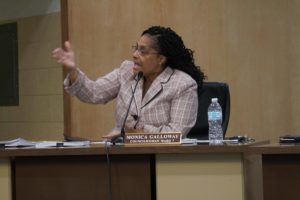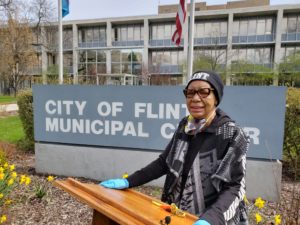By Tom Travis
City Council postponed until Thursday a vote on the $20 million portion of the $641 million water crisis settlement. In a six and half hour meeting, with the first two hours spent bickering over rules and procedures, the council questioned attorneys at length about the water crisis settlement.
At Monday’s meeting, it appeared that some council members fluctuated between voting “yes” and “no” to accept the $20 million while some held firm to their positions.

Flint Resident, Vicki Marx, had her car decorated with signs at a rally honoring the sixth anniversary of the Flint Water Crisis in April 2020. (Photo by Tom Travis)
City Attorney Angela Wheeler, assistant City Attorney Bill Kim, attorneys Rick Berg and Sheldon Klein explained to council, as they have done in previous meetings, the importance of approving the $20 million insurance settlement. They clarified again that the $641 million settlement is moving forward, with or without Flint’s approval.
The Flint City Council is only responsible for voting to approve or not approve that a $20 million portion be added to the settlement as a whole, the attorneys once again explained. The $20 million is offered from the City’s insurance company because the City of Flint is named as a defendant in the settlement case.
Wheeler read a letter from attorneys Corey Stern and Ted Leopold. The letter was written in response to questions from City Council President Kate Fields. The letter in part reads:
2020.12.14 Letter to COF (Out on Settlement) (1)“While we believe it would be in the best interest of the citizens of Flint for the City to participate in the settlement, we are confident that the global settlement will go forward either with or without the City’s participation. If the City chooses not to participate, we are certain that the individual trials and the class case against the City for its role
in causing the water crisis will yield results significantly in excess of $20,000,000.”Attorney Corey Stern of Levy Konnigsberg law firm in New York City.
“We are unwilling to support anything in the Council President’s correspondence, as the effect of her proposal would be to delay the global settlement. If her proposal is passed, we willproceed without the City as a participant. To the extent the communication was sent as a resident with a claim against the City (rather than as a fiduciary to the City), her voice can be heard by the Court through the judicial approval process.”
The full letter can be read here:
Fields presented a six-point proposal for the council to consider. Fields’ proposals include:
–Allowing the City Council to obtain outside legal counsel
–Allowing the deadlines to be changed to allow council to work with the new legal counsel to research and obtain all necessary documents
— Allowing Judges Levy, Farrah and Murray to appoint a mediator to assist in resolving water litigation cases,
–Re-allocate 2% of the 18% of the settlement (approximately $2.3 million) to be refunded to residents for “water they paid for but could not use” during the water crisis.
— Launch an investigation by the Michigan Attorney General’s Office into alleged illegal and improper use of approximately $10.3 million out of the City’s Water and Sewer Funds, by four of the five Flint emergency managers (i.e., Ed Kurtz, Michael Brown, and Gerald Ambrose) plus previous Mayors Dayne Walling and Karen Weaver,
–The final proposal is for Mayor Sheldon Neeley to sign this agreement.
Fields’ three-page proposal can be read in its entirety here:
Amendment of CONDITIONAL ACCEPTANCE for Reso #200488In an unusual occurrence, Councilperson Eric Mays (1st Ward) seemed to agree with Fields’ proposals and sided with her. Councilperson Monica Galloway (7th Ward) initially agreed with Fields’ proposals but then in her second round of questioning said she had doubts and was prepared not to support it.
Attorney Klein told Fields the “conditional acceptance” she proposed is a “rejection” of the water crisis settlement. Fields said she “didn’t believe that was true.”
Water Warrior and local activist Clair McClinton called into the council meeting during public speaking. “This is another betrayal by the State of Michigan. The State of Michigan could have settled this case a long time ago.
“But instead of settle it they decided to fight it tooth and nail. They went to every court, the appellate court, the Michigan Supreme Court, Federal court trying to dismiss our cases. Now that they don’t have no other court to go to now here they come with this paupry [sic] $600 million,” McClinton said.
Claire McClinton speaking at the sixth anniversary of the Flint Water Crisis in front of City Hall in April 2020. (Photo by Tom Travis)
“The $20 million that the City is talking about you are co-signing the $600 million. Which is not enough money. The formulas are flawed. You are endorsing this flawed settlement. And if you all remember when Gov Snyder went to the Congress and said before the panel and he blamed the Flint City Council for the water switch saying that, ‘the city council agreed to it’ and that’s what will happen to this.
“No matter what you say, if you sign off with the $20 million and co-sign the $600 million you are saying that you agree with that settlement. Whether you want to or not that’s going to be the perception. And if I was one of the attorneys I sure would use it, ‘well the city council voted for it. So you better be careful of the impact of what you’re doing.
“I’m really proud of the citizens of Flint. And I’m proud of city council for your probing questions. You are acting like ‘Flintstones’ tonight. We got a history and reputation of fighting. We don’t take wooden nickels. And we sure don’t take our residents’ lives and say that we don’t matter,” said McClinton.
Client-attorney relationship
Additionally, Fields asserted the client-attorney relationship between the City’s attorneys and the Council [the client] in the water crisis settlement. Fields demanded that the city council as the client “is entitled to be a part of the process to be able to agree or not agree” as the settlement is worked out. The attorneys maintained that they did not have to disclose all the documents to council because they are not the client. Many of the council members disagreed.
Fields further stated, “Judge Levy can bring everyone back to the table. And Levy can tweak [the settlement], as Mr. Mays suggests.” Fields reminded the council that the client [the city council] has to be notified and informed of all documents in the Settlement. Fields stated that she wasn’t notified of the nearly 1,000 pages of the settlement. Over 800 of the Water Crisis Settlement documents are accessible at the end of this article.
“We weren’t given the sufficient documents well into December until finally at my request to attorney Kim.” Fields went on to say that we [the city council] have been given this party line, ‘you have to accept the $20 million, if you don’t accept the city will go bankrupt.’ Fields reiterated that the City legal team did violate professional code and did not supply the documents.
“They [the City’s legal counsel] didn’t even give us the Settlement documents. This may be reason enough for one of these Judges to say you are violating this code of conduct. That may well give us the opportunity to renegotiate.”
Fields put Judge Judith Levy’s address up on the screen for the public to write to her and voice concerns about the settlement. The address is Judge Judith Levy, U.S. Eastern District of Michigan, 200 East Liberty Street, Suite 300, Ann Arbor, MI 48104.
Wheeler retorted, to Fields’ point that the council was not fully informed of all the settlement documents, that in four different council meetings over the last few months that the City’s attorneys attempted to enter into executive session with the council to discuss the matters of the water crisis settlement and each time the council voted not to go into executive session.
Councilperson Herb Winfrey (6th Ward) responded by saying that was because the council was being asked to sign an affidavit if they entered into that executive session.
“That’s strange to sign an affidavit,” Winfrey said. “Never in my days on council have we had to sign an affidavit. The discussion during executive sessions we usually can’t talk about those discussions anyway, so why an affidavit?”

Former City Council President Monica Galloway (7th Ward) speaking at a council meeting in January 2020. (Photo by Tom Travis)
Councilperson Galloway (7th Ward) added, “I’m extremely tired of decisions that have been made by the State that have impacted the city to only come into the public square of this council that if this goes wrong that we’re liable. They did it with GLWA (Great Lakes Water Authority). You tried to talk to us under the premise that we have to sign away our rights and that didn’t sit well with me.”
Galloway in turn made a motion that the Council seek outside legal counsel.
Galloway continued, “[to the attorneys] This doesn’t sound right, it seems like an intimidation tactic. because we don’t have someone looking out for the specific interests of this legislative body with the weight of such difficult decisions.”
Councilperson Jerri Winfrey-Carter (5th Ward) said, “I feel like the whole thing has been done under the table. The lawyers are not being truthful with this whole deal. Things are not being transparent….I am not gonna vote for the city to go into this settlement. That means we agree with the settlement. When are we gonna stand up and fight. When are we gonna say enough is enough. When are you gonna stop treating our city like this?”

5th Ward Councilperson Jerri Winfrey-Carter speaking at a 2019 council meeting. (Photo by Tom Travis)
Councilperson Maurice Davis (2nd Ward) was the singular council person who praised the City’s legal team for their work on the settlement. Davis said to his council colleagues, “How dare you, How dare you? They are the professional attorneys, listen to them…We need to pass this to safe-guard our residents,” Davis said.

2nd Ward Councilperson Maurice Davis pictured in a 2019 City Council meeting. Councilpersons Santino Guerra (3rd Ward) and Kate Fields (4th Ward) are pictured to the right of Davis. (Photo by Tom Travis)
Over 800 pages of settlement documents filed in the court can be viewed here:
FWC_ProposedSettlementDocs_1319-2EVM Managing Editor Tom Travis can be reached at tomntravis@gmail.com.




You must be logged in to post a comment.